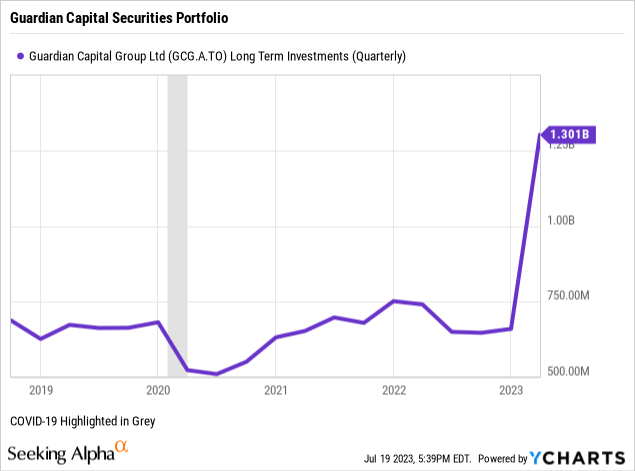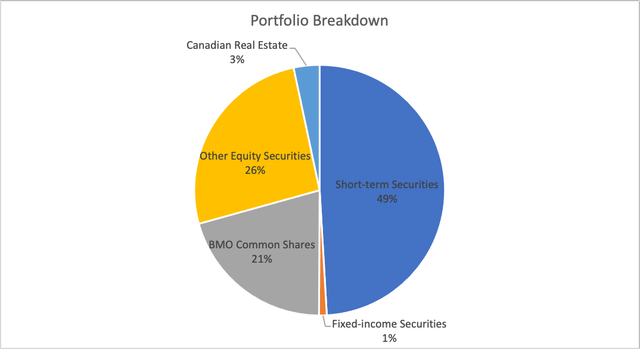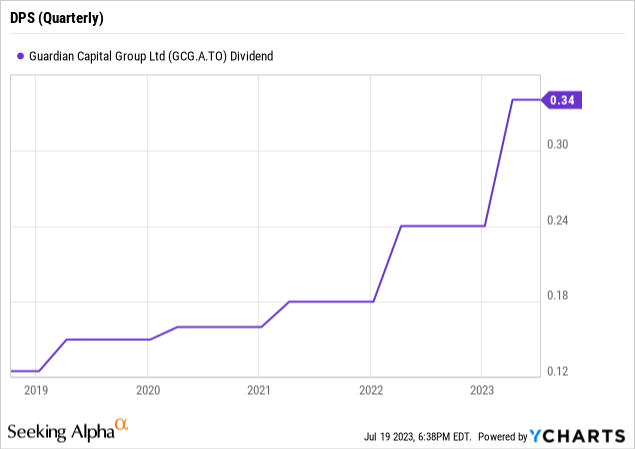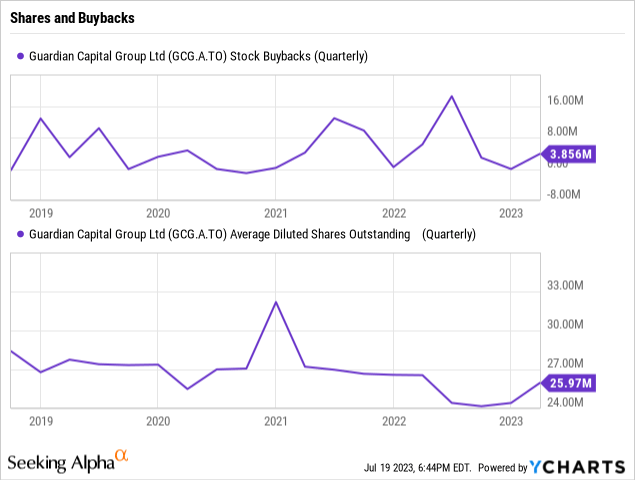Introduction & Investment Thesis
Guardian Capital (OTCPK:GCAAF), a prominent Canadian asset manager, boasts more than just a thriving operating business. Their portfolio of securities, totaling $1.3 billion as of March 31, 2023, adds another layer of value to the company. Despite this, Guardian Capital has persistently traded below its fair value. However, the most recent quarter has revealed a mispricing that can no longer be overlooked.
If we exclude Guardian’s operating business, an examination of the securities on a per-share basis demonstrates that their value surpasses the closing price of $40.99 on July 19th, 2023, by an astonishing 25%.
In this article, we will delve into the factors contributing to this undervaluation and explore why Guardian Capital stands as a hidden gem in the Canadian market. Through my analysis, I aim to shed light on the true potential of this asset manager and unveil the opportunities it presents for investors.
Corporate Timeline
- Guardian Capital is founded by Norman Short, Ralph Horner, and Alan Grieve and is later branded Guardian Capital LP (1962).
- Guardian Group of Funds (GGOF) is created to provide management, administration, and marketing for open-ended mutual funds (1986).
- Worldsource Financial Services is founded as a mutual fund dealer and merges with Capital Management Group to form Worldsource Financial Management Inc (1989/1996).
- Alexandria Bancorp is formed as a fully-licensed Schedule B bank in the Cayman Islands (1990).
- Guardian Capital Advisors LP is founded to provide private wealth solutions to high-net-worth clients (1992).
- GGOF is sold to BMO in exchange for common stock (2001).
- Worldsource expands by merging with IDC to become one of the largest life insurance agencies in Canada (2011).
- Guardian acquires GuardCap, a small boutique firm focused on emerging market equities based out of London, UK (2014).
- Guardian acquires a 70% stake in Alta Capital in the United States (2018). Guardian acquires a majority stake in Modern Advisors and adds multiple ETFs to their product channel (2020).
- Guardian acquires BNY Mellon Wealth Management and changes the name to Guardian Partners Inc (2021).
In 2022 Guardian Capital launched Guardian Smart Infrastructure Management (GSIM) to invest in private infrastructure opportunities, they acquired a majority stake (60%) in Rae & Lipskie Investment Counsel, a private wealth manager, and they launched GuardPath Longevity Solutions, the first of its kind solution package designed to solve the discrepancy between human and portfolio longevity. In 2023, Guardian Capital sold the aforementioned Worldsource business to Desjardins.
(Note: This information can be found on Guardian Capital’s website – it’s included here as many of these points will be brought up throughout the article)
Investment Portfolio
Over the years, Guardian Capital has maintained a substantial securities portfolio, with a significant portion invested in one of Canada’s leading banks, Bank of Montreal (BMO:CA). Recognizing the importance of risk diversification, the company has gradually reduced the proportion of assets invested in BMO to mitigate concentration risk and to invest capital in other growth initiatives.
In a strategic move to simplify Guardian’s operating structure, they made a notable transaction by selling their Worldsource business to Desjardins for $750 million. This divestment resulted in a net gain of $619.5 million. Guardian immediately reinvested the proceeds into short-term money market securities offering an attractive yield of approximately 5%. As a result of this sale and reinvestment, the company’s securities portfolio has now surpassed $1 billion:
Securities Value Through Time (YCharts)
The portfolio is currently split between short-term securities, fixed-income securities, BMO common shares, other equity securities, and Canadian real estate. The portfolio weight of each section can be seen below:
Breakdown of Securities Portfolio (Author’s Illustration)
The securities portfolio held by Guardian Capital serves as a valuable revenue stream, providing a consistent income of approximately $5 million per quarter, equivalent to $20 million annually. Over time, this revenue stream has grown, driven by the increasing dividends from investments like BMO and other equity securities. Furthermore, the recent rise in interest rates has boosted the yield earned on fixed-income securities and money market securities, adding to the portfolio’s income generation.
In the most recent quarter, Guardian Capital realized $8 million in dividend and interest income, and their Management’s Discussion and Analysis (MD&A) report stated that the proceeds from the sale of Worldsource contributed $2.4 million in a single month. Extrapolating this data for a yearly forecast, the company could potentially earn $20 million from dividends and $28.8 million in interest income, totaling $48.8 million ($1.88 per share).
Additionally, the securities portfolio grants Guardian Capital a position of high flexibility. With the proceeds from the Worldsource sale and generating significant revenue, the company is well-prepared to capitalize on opportunities, such as buying equities or other securities at favorable prices during market downturns.
Despite this strong financial position and a per-share value estimated at over $51.06, Guardian Capital’s shares trade at $40.99 as of July 18th, 2023. The market’s seemingly undervaluation of the company raises questions as to why this is the case. Some may assume that the market overlooks Guardian’s true value due to perceived unprofitability in their asset management operation.
Operating Business
Guardian Capital, with a total management portfolio of $56.33 billion, comprising $52.22 billion in Assets Under Management (AUM) and the remainder as Assets Under Administration (AUA), reported revenue of $46.54 million in the first quarter of 2023, consistent with past quarters. Despite the highly competitive nature of the asset management industry, Guardian Capital’s presence in three major countries (Canada, the USA, and the UK) has strategically diversified their income streams.
While Guardian’s performance is influenced by market conditions, the company has demonstrated remarkable consistency in generating operating profits. It’s essential to consider that fluctuations in the value of their portfolio are realized as profits and losses due to fair value measurements each quarter. To accurately evaluate the profitability of Guardian Capital’s operating business, these portfolio valuation changes must be excluded.
To assess the value of the operating business, a comparable technique based on an EBITDA multiple is employed. Analyzing the investment management segment’s financials in the first quarter of 2023, the company recorded:
- Revenue: $47.017 million
- (Subtract) Expenses: $37.179 million
- (Add Back) Amortization and Depreciation: $2.698 million
- (Add Back) Interest: $0.207 million
This results in a Total EBITDA of $12.743 million for the quarter, which, when annualized, equals $50.972 million.
Drawing comparisons with other publicly traded Canadian asset managers such as AGF, Fiera, CI Financial, and IGM Financial, we derive an EBITDA multiple of 6.8x. However, considering the size premium associated with IGM, CI, and Fiera, the multiple is adjusted down to 5.5x.
Peer Multiples for Valuation (Capital IQ)
With a 5.5x EBITDA multiple applied, the operating business of Guardian Capital garners an estimated value of $280.346 million, translating to $10.79 per share.
Capital Allocation
Guardian has also been actively buying back their shares under the NCIB and has consistently raised their dividend. As Guardian has seen their cash position increase substantially from the sale of Worldsource, the added flexibility should enhance the return profile for Guardian.
Dividends Per Share (YCharts)

Share Buybacks and Shares Outstanding (YCharts)
What to Watch for in Q2
Guardian Capital will report its Q2 2023 earnings on August 11, 2023. Assuming that no sale of securities occurred during the quarter I project their securities values will be:
| Security Type | Q1 2023 | Benchmark | Price Change in Benchmark | Predicted Q2 2023 |
| Short Term | $638,852 | 1 Year T-Bills | Interest Income (5%) | $638,852 |
| Fixed Income | $12,929 | FTSE Canada Universe Bond Index | -1.75% | $12,702 |
| BMO Common Shares | $268,180 | BMO:CA | -1.55% | $264,023 |
| Other Equity | $338,178 | S&P500 | 8.29% | $366,212 |
| Canadian Real Estate | $43,345 | S&P/TSX Capped Real Estate Index | -3.8% | $41,698 |
| Total Book Value | $53.88 | N/A | N/A | $55.57 |
Most of the increase in fair value per share will come from the decrease in shares outstanding over the period as Guardian has repurchased their own shares throughout the quarter.
The next important thing to focus on is the level of AUM. In the second quarter of 2023, the world index increased. I expect that the level of AUM for Guardian will also increase, mainly driven by larger institutional asset-holding values. This should increase Guardian’s revenue as it’s derived from asset management fees. I will monitor this amount closely as it’s a key variable in Guardian’s operating business and is an important factor when considering the value of their operating business.
Conclusion
These findings underscore the substantial worth and financial strength of Guardian Capital’s operating business. With solid valuation metrics and robust fundamentals, Guardian Capital proves to be a promising investment opportunity for those seeking enduring value and potential growth in the asset management sector. While a market downturn would impact their balance sheet, Guardian Capital is already trading below its book value.
Editor’s Note: This article discusses one or more securities that do not trade on a major U.S. exchange. Please be aware of the risks associated with these stocks.
Read the full article here



